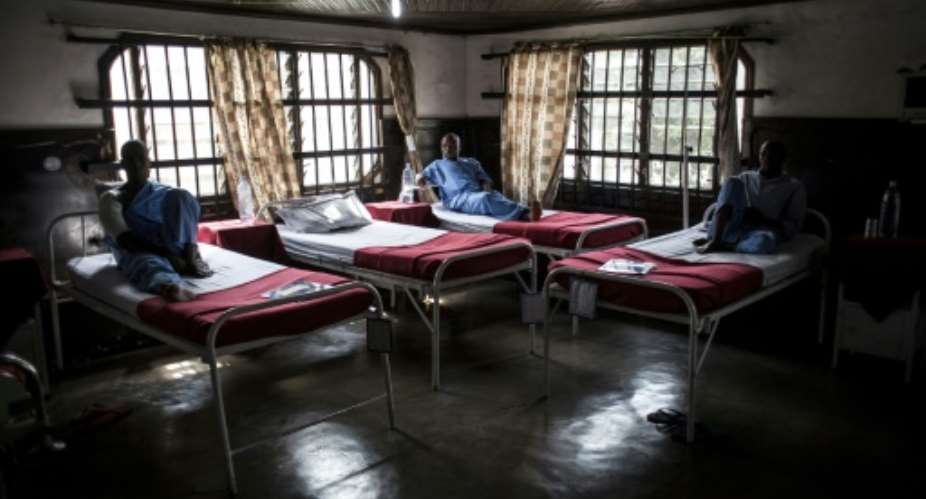The UN's chief peacekeeper was in eastern DR Congo on Friday to visit those wounded in last week's deadly ambush that killed 14, the worst attack on a peacekeeping mission in 24 years.
A week after the bloodshed, Jean-Pierre Lacroix was in Goma where he visited around 30 of those injured in the December 7 attack in North Kivu province which targeted a base of the UN's MONUSCO force.
The UN said the ambush, which sparked a prolonged gun battle in which 53 peacekeepers were wounded, was carried out by suspected ADF rebels, a shadowy group dominated by hardline Ugandan Muslims that is one of several armed groups active in the North Kivu region.
All the UN victims, both the dead and the wounded, were from Tanzania, and five Congolese soldiers were also killed.
"I have just come from Tanzania where I was able to see that the whole country is behind you," Lacroix told the wounded at a MONUSCO-run hospital in Goma, North Kivu's capital.
 Map of DR Congo locating Nord-Kivu where 14 UN peacekeepers and five Congolese soldiers were killed in a rebel ambush on December 7
Map of DR Congo locating Nord-Kivu where 14 UN peacekeepers and five Congolese soldiers were killed in a rebel ambush on December 7
On Thursday, Lacroix was in Dar es Salaam to pay homage to the 14 victims killed in the attack on the base in Semuliki, which is located in a very dangerous area.
During the visit, several peacekeepers spoke about the night of the ambush, telling him there were hundreds of attackers.
"There were a large number of attackers, around 300. They were dressed in civilian clothing although some were wearing Congolese army gear," said two of the men who were lying in neighbouring beds.
The attackers were heavily armed and had RPG rocket-launchers, they said.
'They've failed'
"If they wanted to force us to leave so they can carry on doing what they do, well they've failed. The base will live on," said one UN soldier, alluding to the traffic in minerals which has fuelled the emergence of armed groups in North Kivu.
The attack was the bloodiest against MONUSCO, the UN force that was deployed in the Democratic Republic of Congo in 1999, and the worst against a UN force since the death of 24 Pakistani peacekeepers in Somalia in June 1993.
DR Congo's huge eastern region has long been wracked by violence, but fighting between government soldiers and militia groups, as well as inter-ethnic clashes, has increased significantly this year.
North Kivu province, which borders Uganda and Rwanda, has seen a particular uptick in killings and kidnappings between rival ethnic groups.
Since October 2014, the hardline ADF -- or Allied Democratic Forces -- has been accused by Kinshasa and the UN of killing more than 700 people in the Beni region, where last week's attack also took place.





 April 20: Cedi sells at GHS13.63 to $1, GHS13.06 on BoG interbank
April 20: Cedi sells at GHS13.63 to $1, GHS13.06 on BoG interbank
 Dumsor: I'm very disappointed in you for messing up the energy sector — Kofi Asa...
Dumsor: I'm very disappointed in you for messing up the energy sector — Kofi Asa...
 Dumsor: Instruct ECG MD to issue timetable and fire him for lying — Kofi Asare t...
Dumsor: Instruct ECG MD to issue timetable and fire him for lying — Kofi Asare t...
 Ashanti region: Road Minister cuts sod for 24km Pakyi No.2 to Antoakrom road con...
Ashanti region: Road Minister cuts sod for 24km Pakyi No.2 to Antoakrom road con...
 Train crash: ‘How could any normal person leave a car on rail tracks?’ — Frankli...
Train crash: ‘How could any normal person leave a car on rail tracks?’ — Frankli...
 Train crash: Driver of abandoned vehicle not our branch chairman nor secretary —...
Train crash: Driver of abandoned vehicle not our branch chairman nor secretary —...
 Kenya pays military homage to army chief killed in copter crash
Kenya pays military homage to army chief killed in copter crash
 US agrees to pull troops from key drone host Niger: officials
US agrees to pull troops from key drone host Niger: officials
 Mahama vows to scrap teacher licensure exams, review Free SHS policy
Mahama vows to scrap teacher licensure exams, review Free SHS policy
 Government will replace burnt Madina shops with a new three-story, 120-store fac...
Government will replace burnt Madina shops with a new three-story, 120-store fac...
